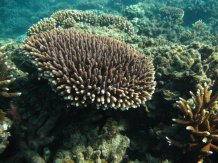Articles

Acropora millepora, a species of branching stony coral. Picture taken during research on the Great Barrier Reef by Line K Bay. From https://www.eurekalert.org/
Pioneering project to unlock decision making process behind larval settlement on coral receives funding boost
A new research project, designed to unlock a greater understanding of one of the key factors that affects coral recovery, has received a significant funding boost.
An international team of researchers, including Professor Gaspar Jekely from the University of Exeter’s Living Systems Institute, has received $750,000 to investigate how larvae find the most appropriate place to settle in the reefs to survive.
The three-year project, entitled “Deconstructing neurobiology of settlement decision-making in coral larvae”, received the significant grant from the Human Frontiers Science Program (HFSP).
Coral reefs are unparalleled biodiversity hotspots with, according to the World Wildlife Fund, an estimated US$30 billion of economic value.
However, corals are being decimated at an alarming rate, due to the effects of climate change. With episodes of coral death becoming more frequent worldwide, the need to gain a greater understanding of factors that affect coral recovery has become more significant.
Larvae settlement is one such factor, as they need to choose an area with a good source of nutrients, light and shelter. The larvae use a host of sensory cells, and exhibits a complex searching behavior, to find the most appropriate place to settle.
In this new project, between Prof Mikhail V. Matz of the University of Texas, Austin, and Prof Jekely, the researchers will study the molecular and neuronal mechanisms of coral larval settlement.
Their aim is to identify intrinsic processes that might be responsible for success or failure of coral recruitment. The project will be made possible by combining expertise from the two collaborating labs.
The team will work on the model coral Acropora millepora, which is a representative of the largest and the most ecologically important genus of reef-building corals.
Prof Jekely said: “We are very pleased to have received this award and very excited by the project. We aim to obtain an unprecedented high-resolution view of all the nerve cells in a coral. Our hope is that this will help us understand the control of coral recruitment.”
The International Human Frontier Science Program Organization (HFSPO) announced some $33 million USD to support the top 4% of the HFSP Research Grant applications over the coming three years.
The 28 winning teams of the 2020 competition for the Research Grants went through a rigorous year-long selection process in a global competition that started with 702 submitted letters of intent involving scientists with their laboratories in more than 50 different countries.
The program funds cutting-edge, risky projects and it is the only program that supports international teams of scientists with laboratories in different countries. HFSP Program Grants appeal to the innovative and creative potential of the research teams. Frontier life science knows no limits as winning teams propose to investigate, for example, the influence of plant heat stress on global warming, or biological protein springs as allosteric modulators.
The lists of all 2020 HFSP awards are available at http://www.hfsp.org/awardees/newly-awarded
Date: 3 April 2020
